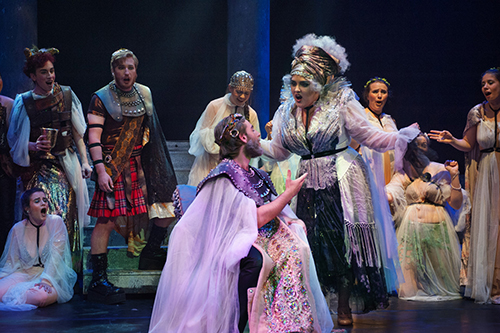Campus News
The savior of the opera
With dampened prospects for in-person classes, rehearsals, and performances this pandemic year, UC Santa Cruz’s opera program is adapting with help from donor Scott Lord

UCSC's 2017 production of Offenbach's "Orpheus in the Underworld." Photo: Steve DiBartolomeo

“It’s really special for undergraduates to get that experience,” said Sheila Willey, who leads the program. Most university opera programs reserve significant roles for graduate students.
Shelter-in-place orders in March interrupted the work that would have led to performances. But that wasn’t that end of the opera’s big show for 2020. L’Elisir d’Amore goes on this fall as a recorded video production.
More than Zoom
Performers will be set up in their own homes with professional audio equipment and green screens to record their performances. Video production will be directed by David Murakami (Porter ‘14, digital media), who teaches production design at UC Irvine and has done design and film direction for several Bay Area theater groups.
The new approach to performance will give students valuable experience working with digital tools they may need in their careers, Willey noted.
“My top goal is that it gives our students a way to keep connecting together and creating together and learning about opera,” she said.
The opera’s shift to digital this fall is possible thanks to the support of alumnus Scott Lord (Porter ’76, history), a donor to the program for most of the last decade. Lord, an attorney who litigates cases in the construction industry, is a devoted fan of the form.
“Opera is a magical confluence of singing, music, acting, and design,” he said. “Also, the good operas address personal and philosophical issues. They are often moving and thought provoking.”
In particular, Lord followed Opera Parallèle, the acclaimed performance group led by Brian Staufenbiel and Nicole Paiement—who led the UCSC opera program prior to Willey. Through them he learned about the UC Santa Cruz program.
“I started seeing performances and was really impressed with what they were able to do with what I considered a pretty limited budget,” Lord said.
An investment in future performers
At the time, Lord had been looking for ways he could contribute to UC Santa Cruz. The opera program was a fit, and Lord has been a major supporter for seven years.
“As a philanthropist looking at cost benefit: With a relatively modest contribution they were training a lot of people, including some who went on to be serious singers as well as directors and designers,” he said.
In a typical year for students, the year-long opera program begins with casting in fall, practice—and perhaps a child-friendly chamber opera—in winter, and rehearsals leading up to final performances in spring quarter with professionally designed costumes and sets. Usually, sets, lighting, costumes, and design fees are all funded by the opera’s donors. As the implications of COVID-19 became clear, Lord’s generosity enabled the opera to envision performing in the pandemic era.
“This planning was only possible because of support from donors like Scott,” Willey said.
Additional funding from the federal CARES Act helped cover some of the new expenses. Lord’s ongoing support means Willey is able to also schedule a spring production of Handel’s Semele and, in the 2021–2022 academic year, a premier by Michael McGushin of his new opera, The Nightingale.